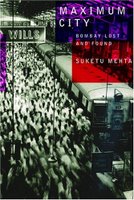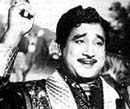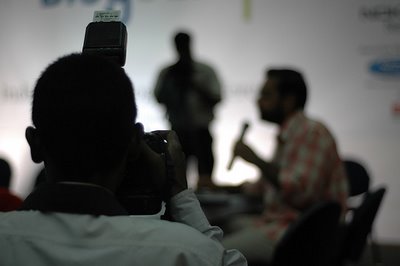My subject here today is blogging as journalism. I must start with a frank admission that the history of journalist-bloggers is not familiar to me. But the logical place to start is with this question: When did blogging as journalism begin in india:
India Uncut’s Amit Varma’s decision to cover the tsunami – which saw the daily hits to his blog rise from a mere 800 to 13,000 – must be a recent landmark. Another would be Gaurav Sabnis’s exposure of IIPM in August 2005 and his subsequent resignation from IBM.
The next question – one that is often asked - is blogging journalism? Can blogs that carry news – as original reportage or analysis – be called journalism?
Unfortunately, I wasn’t able to look up any discussion about the Indian situation on the subject on the Internet. But let me quote you an example from the American media.
Last April, PBS, an American channel, asked this question on its flagship programme, Newshour. A top executive from MSNBC said no, it wasn’t. Bloggers can’t be called journalists, he said. He pointed to the absence of the editorial filter in most blogs and argued that, because of this absence, the content in blogs wouldn’t constitute journalism. Bloggers appearing on the same programme, however, disagreed.
What is an editorial filter? Mainstream media – newspapers, radio and tv channels - act as a gatekeepers of news. They decide what is news and what isn’t and this is what we consume on a daily basis. Let’s return to the argument – is blogging journalism?
When small, independent online publications with an amateur staff perform original reporting on community affairs, few would contest that they're engaged in journalism. Example: Chennaionline. You can have no doubts in ur mind that what chennaionline does is journalism. For those not familiar with chennaionline, I am here referring to sites like drudge report.
When citizens contribute photos, video and news updates to mainstream news outlets, many would argue they're doing journalism. Example the scores of videos all of us saw on ndtv during the tsunami. Or those we see of the Katrina or any disaster for that matter.
But here is the moot point. when bloggers comment on and link to news stories, is that journalism? Usually no -- but it depends. When the blogger adds personal commentary that relies on original research, or if someone considered an authority on the subject does it, some, at least, would consider it journalism.
When a blogger conducts a phone interview with a newsworthy subject and posts it to his Weblog –like kiruba did a few back with Guy Kawasaki-- or somebody does some research to turn up the address, phone number and e-mail of an alleged rape victim and post these details on their blog -- some would consider those acts of journalism, too.
But even though the question is blogging journalism is an attractive one, it’s almost irrelevant now. Many are convinced that it is indeed journalism. And the blogs at the tsunami have added credibility to the argument that blogging is indeed journalism. Now with more recent events, the argument has moved forward. We must now attempt to scratch out the deeper pattern.
But before we do that we might consider the differences that blogging has with Big Journalism.
What exactly are the differences between traditional mainstream media and bloggers who engage in journalism?
Two aspects are immediately apparent. One is interactivity. When u write an article in a newspaper or broadcast a report on the channel you talk. When u blog, u converse. The other is the lack of space constraint. A blogger has flexibility of space. In a magazine or a newspaper, a journalist is constrained by length – he can’t write too much and, in instances where he might want to share a vignette or a telling observation, he can’t write too little. On a blog, that isn’t an issue.
Third is the ability to hyperlink: on a blog I can link to pictures, audio clips and videos to tell u the story. I have the ability to take the reader with me on the journey. I can even link to another blog to add to another aspect of the story or even borrow a bit from a newspaper or tv channel. This btw is a difference between newspapers and new media.
Four immediacy or Instantaneity: when you're writing for, say, a weekly magazine, it seems like it takes forever to see your work in print. With a Weblog, you hit the send key and it's out there. It's the perfect “disposable journalism” for our age.
Five: a blogger can add the personal touch. He or she can tell the story in a personal tone. This is the opposite in mainstream media. The word ‘I’ as you are taught in journalism school is to be shunned.
Let’s get to the two less obvious differences. These are two points, which I as a journalist value greatly.
Creative freedom: Part of a blog's allure is its unmediated quality. Allow me to paraphrase from a website. This is a journalist, who has a widely read blog in the US who said this. “For a journalist, there's no luxury like the luxury of the unedited essay. There's an enormous freedom in being able to present yourself precisely as you want to, however sloppily or irrationally or erratically. I don't have an editor to pitch the story to, or a copy editor who decides he's not happy with my syntax... You think it, you write it, you put it out to the world."
The other is the Lack of marketing constraints. "The people who are interested in your perspective find you, instead of you having to find a publication that reflects their interests. You don't have to necessarily tailor your work for a certain readership or demographic. A god given gift that is to bloggers, if you ask me.
We must also differentiate between the terms citizen journalism and blogging – both are often freely interchanged but mean two different things:
What is citizen journalism? As many others are doing now, I turned to the wikipidea: Citizen journalism, also known as "participatory journalism," is the act of citizens "playing an active role in the process of collecting, reporting, analyzing and disseminating news and information"
From that definition it’s clear the citizen journalism is altogether a different creature from the simple act of a blogger writing a news report or an analytical piece. Citizen journalism surely accommodates the act of blogging but when I see a report from Jawaharlal Nehru University done by that university’s students on reservation in higher institutions appear on CNN-IBN
Or
When merinews, a sponsor for this event, uses ordinary citizens and scholars to write the bulk of its content
That is very different from a blogger sitting alone at home and writing about what he or she thinks of reservation. Or for that matter write an expose on IIPM’s alleged fraud.
Citizen journalism in way precedes blogging. Jay Rosen, who today runs PressThink, which is a blog, was one of the early proponents of participatory journalism. Citizen journalism itself is traced to the 1988 US presidential elections and the erosion of public trust in large media houses. Some Americans were also disgusted with politics and politicians. Somewhere here began the first infant steps towards what we today call citizen journalism.
In more recent times, we can take the highly successful example of ohmynews, a South Korean-based media house, which has used ordinary people to generate as much as 80% of its content. According to the paper, every citizen is a reporter, and now more than 40,000 people have contributed to the content of this newspaper. The widespread availability of broadband and a good computer penetration has made this possible in South Korea. This model is also being replicated in Japan.
But in India where Internet connections are unreliable and computer penetration is low – not many people especially those in rural areas can afford a computer – will citizen journalism be as meaningful or successful? Will it become a force to contend with? Or is it just a fad to get your stuff on TV? Many people with good reason – because of such issues as widespread illiteracy - are highly skeptical of the effectiveness of citizen journalism in India. We do tend to estimate the masses as being ignorant, unaware and dull.
But let’s look for a minute at a highly successful blog - one that has an almost notorious reputation in the television journalism industry. Warfornews.blogspot.com. I cant possibly ignore that site’s contribution to this whole discussion. I am not a regular at the site. Neither have I ever had the guts to comment there. I am told in some organizations that might cost me my job. But whatever your views, warfornews has in the six short months since its inception become one of the most popular media watchdogs – as it were- in India.
A short intro for those of u not familiar: On January 5 this year, theallseeingspy wrote ‘the declaration of war’ on the site. The professed aim was to cover the “war for news” between NDTV and the newly lauched CNN-IBN. Theallseeingspy was eventually joined by two other bloggers- Artemis Zoop and the Watchful Acolyte. All three have made vituperative attacks on the big channels. But this August saw only three posts. And the email leaks from the media houses – that made the site so popular - seemed to have been stopped. But in the meantime the channels have definitely taken a trashing.
I must now got back to the where I began from and start to summarise this brief speech. But for that I would like you get away from the debate surrounding small journalism vs Big Journalism. That debate more or less is killing our perspectives and keeping us from looking at what is both obvious and interesting. What is clear is that there is now an extension of the press. Tom Curley, who runs Associated Press, calls it’s a “huge shift in the balance of power” from the “content providers to the content consumers”.
It means that professional journalism – in the world as a whole – no longer has sovereignty over news. This doesn’t mean that big media houses shut shop and go away. It just means that their influence isn’t singular anymore.
We must also consider another simple fact. Because of the fact that bloggers in their thousands are commenting on news and analyzing it on their own the sovereignty of editorial writers and oped-columnists on the reaction to news is gone. I constantly find that bloggers often go one-up on the sleepy op-ed page. I am not saying that the oped pages of newspapers have lost their influence. But now for their first time, their ideas – and their imagination – are under pressure. And they never anticipated that this was even possible. Now professional journalists are being forced to share media space with amateurs.
Now journalism is seeing a rare moment. Let me quote from a 2003 report titled New Directions for New. It says: “Journalism’s hegemony as gatekeepers of news is threatened by not new technology and competitors but potentially by the audience it serves.” It thought there was a Frankensteinian ring to that quote.
We tend to think of credibility in journalism as a zero sum game. Credibility gained by bloggers is not what is lost by MSMs. Or vice versa. Also we in India tend to look at the Internet a little suspiciously. We are a little sceptic about news that appears on it. But frankly I have no sympathy for people who read that George Bush had an alien love child on the Net and go – really? Also we cannot be blind about the loss of objectivity and credibility in the mainstream media over the years.
What bloggers and journalist have is not an adverse relationship. They certainly can peacefully coexist and learn from one another. Moreover, journalists own a debt to bloggers. Amateurs in a large part – those who have nothing to do with news- are today preparing this platform of blogging that journalists might one day occupy. Or confront. But journalist must see that the tool is being readies and sharpened not by fellow journalist but by bloggers.
To end, let me quote from Amit Varma. This is from an Indian Express article he wrote called ‘the world according to me’, I think sometime after his coverage of the tsunami.
“I find it odd that so many of the news stories on blogs in 2004 focussed on a “Blogs v Big Media” storyline, which makes for an interesting peg, but is misleading. I don’t think that there is a conflict between blogs and any other journalistic medium. Just as TV did not kill print, blogging is no threat to either print or TV. On the contrary, it enhances both the breadth and depth of the coverage that journalism provides and, as one-day cricket did to Test cricket, it might introduce new skills and values to the older forms of journalism. That can only be good for the reader, and that is all that matters.”
 1.Citizen Kane
1.Citizen Kane 




